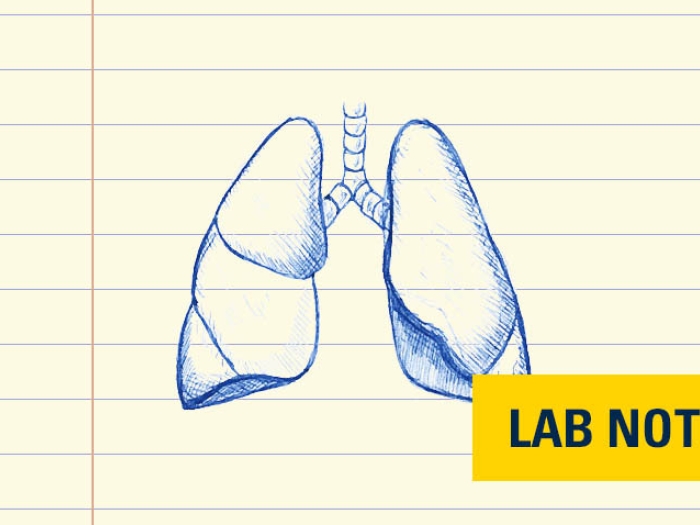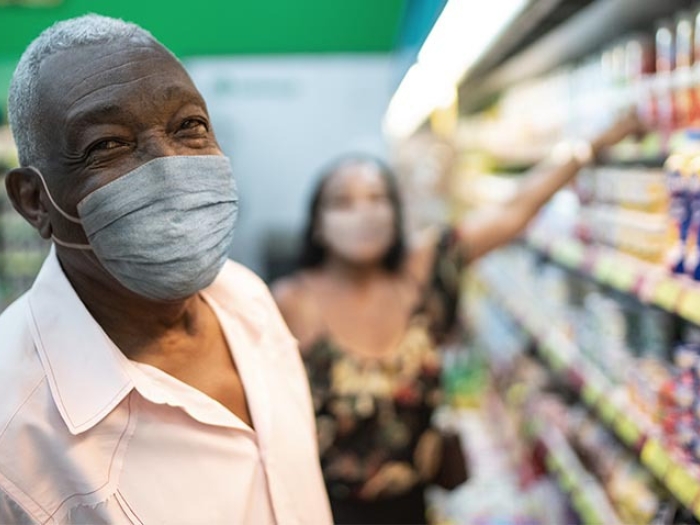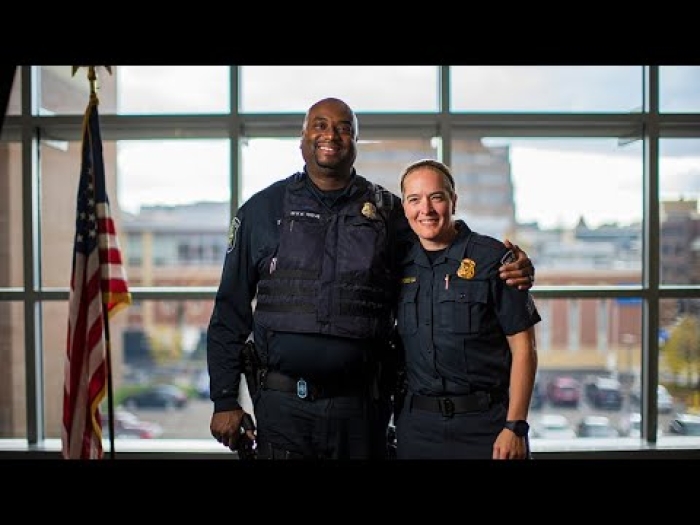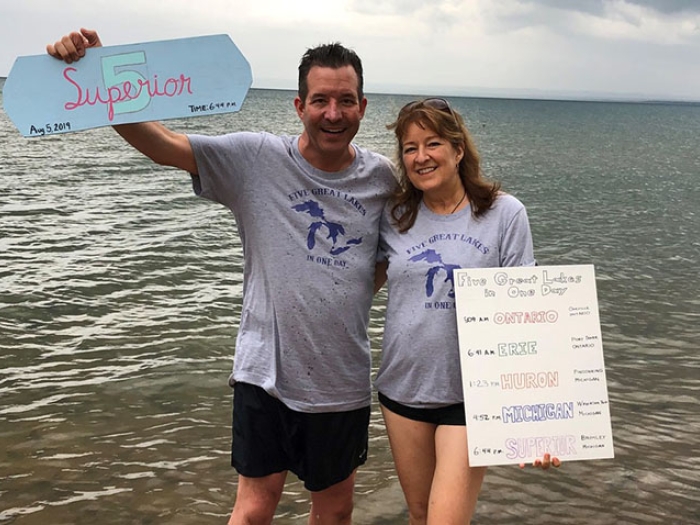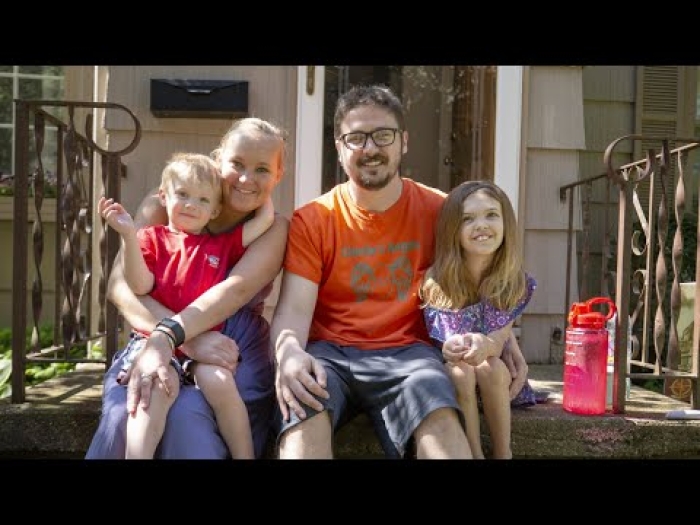A life saving transplant 16 years ago gave Russ Kosteniuk a new lease on life, and a new extended family
11:10 AM
Author |
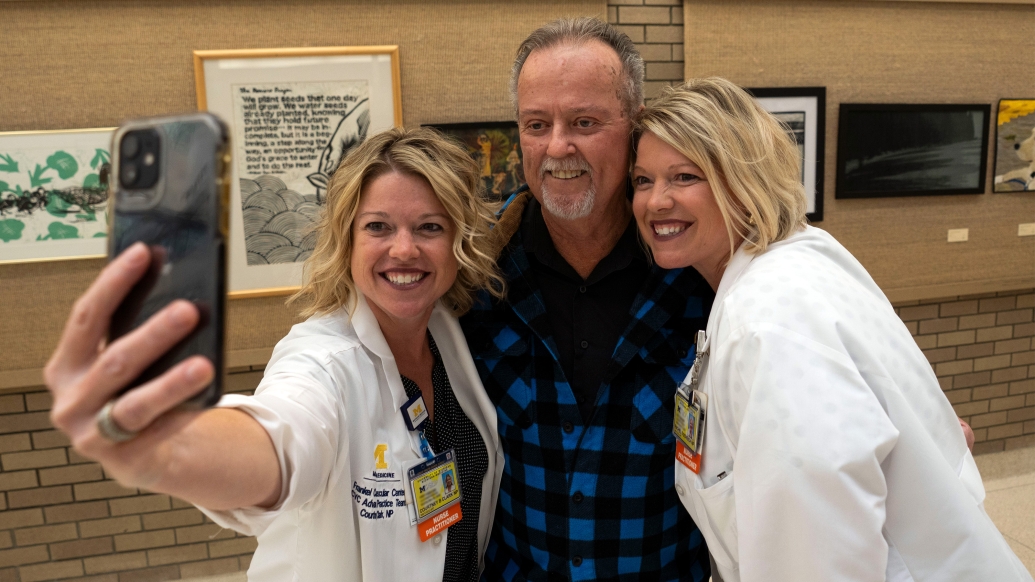
Hugs, laughter and easy conversation in the hallway outside the Taubman Center Transplant Clinic may have caused observers to think they were witnessing a reunion of family members or long-lost friends.
Though perhaps not technically accurate, this is exactly what was happening when Russ Kosteniuk met up with members of his care team from 16 years ago.
Where it all began
Kosteniuk was just 39 years old when he began to experience difficulty breathing.
A successful businessman, husband and father who enjoyed playing hockey in his spare time, Kosteniuk noticed it was getting harder and harder to recover after each shift on the ice during his hockey games.
At the urging of a family member, he scheduled a physical to find out what was going on.
Results from routine bloodwork at that appointment launched years of doctor visits and searching for the root cause of his breathing problems.
He started seeing a pulmonologist near his home but there were no clear answers as his condition worsened.
Over the next several years, Kosteniuk’s health declined to the point where he couldn’t breathe.
“When I tried to take a breath, the air would hit a brick wall,” he said. “The oxygen wasn’t getting to my lungs.”
Although his doctor recommended supplemental oxygen, he wasn’t ready to take that step.
“My son was 13 at the time,” said Kosteniuk.
“You know, life is already difficult at that age and I didn’t want to give him one more thing to worry about.”
A proud parent, he was afraid an oxygen tank would make him appear vulnerable.
But the time eventually arrived when he couldn’t put it off any longer.
After measuring Kosteniuk’s blood oxygen level one day, his pulmonologist issued a firm warning: If you don’t go on oxygen now, you are going to be in big trouble.
Time for a Michigan Answer
Kosteniuk was referred to Michigan Medicine where he saw Robert Hyzy, M.D., a pulmonary disease specialist who currently serves as co-chair of the Critical Care Committee at U-M Health and medical director on University Hospital’s 6D Critical Care Medicine Unit.
Hyzy ordered a series of initial tests, and a diagnosis soon followed.
Kosteniuk had pulmonary fibrosis, a complication of a rheumatologic disorder called scleroderma in which inflammation and scarring of the lungs can progress to respiratory failure.
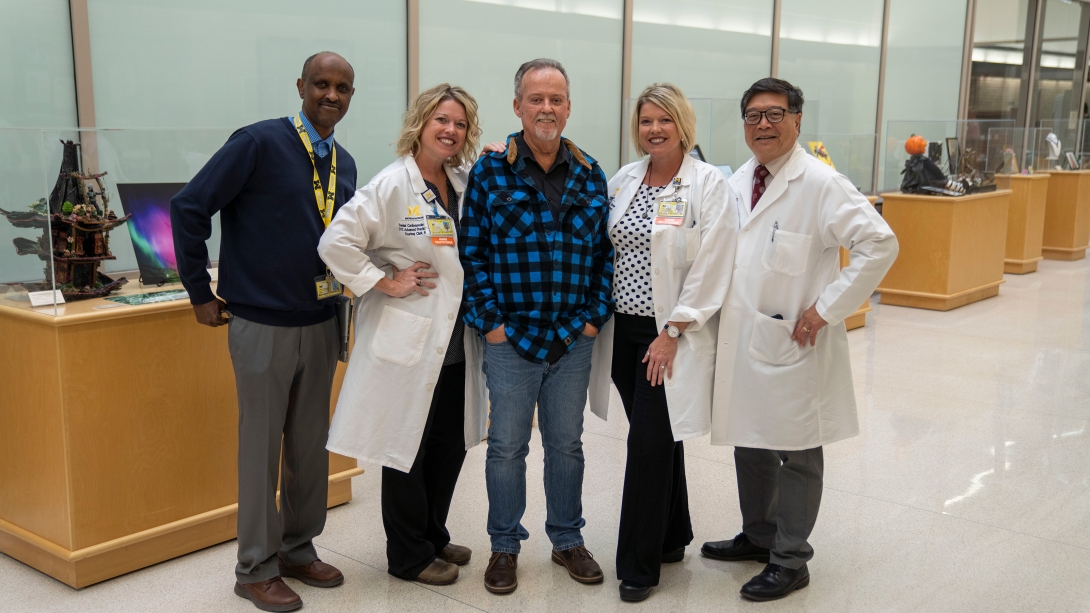
“It wasn’t long before we realized my condition was going to require something major in order for me to get through it,” said Kosteniuk.
That something major turned out to be a double lung transplant at the age of 49.
“At the time of Mr. Kosteniuk’s lung transplant referral, our program typically would not consider offering this procedure to individuals with his disease,” said Kevin Chan, M.D., vice chair for the Department of Internal Medicine and professor of pulmonary and critical care medicine, who began caring for Kosteniuk just prior to his transplant and continues to care for him today.
Chan said esophageal and gastrointestinal problems inherent to scleroderma can contribute to lung infection and rejection of the new lungs.
“Seventeen years ago, data was emerging that with appropriate patient selection and management, lung transplantation could be a successful therapy for an individual like Mr. Kosteniuk,” said Chan.
“He was one of the first – if not the first – patient with scleroderma we listed for lung transplant at the University of Michigan.”
Kosteniuk underwent successful transplant surgery in February of 2008.
Hazy days, clear memories
During much of his hospital stay, Kosteniuk felt as though he was in a fog.
He was heavily medicated and groggy for the first few days after surgery.
“It seemed like the blink of an eye but also felt like it was forever,” he said.
Despite his hazy state, Kosteniuk has clear memories of meaningful things that happened during that hospital stay.
“When my family and I arrived at the Frankel Cardiovascular Center, a doctor was walking out the door. He smiled and said, ‘good luck Mr. Kosteniuk.’ I'm not sure who that was but I was impressed that he knew who I was.”
Kosteniuk remembers a care team that was made up of people who truly cared, professionals who instilled in him the confidence that everything would be okay: from those like Hyzy and others who helped manage his condition prior to surgery, to transplant surgeon Allan Pickens, M.D. (who is no longer at Michigan Medicine), to the nurse who monitored him constantly in the hours after surgery.
“A moment that I'll never forget,” he said, “is one late night in the ICU. It was dark and quiet when I felt that someone was in my room. I opened my eyes and Dr. Pickens was standing at my bedside. He patted my arm and asked, ‘How are you doing buddy?’ That meant a lot to me,” said Kosteniuk.
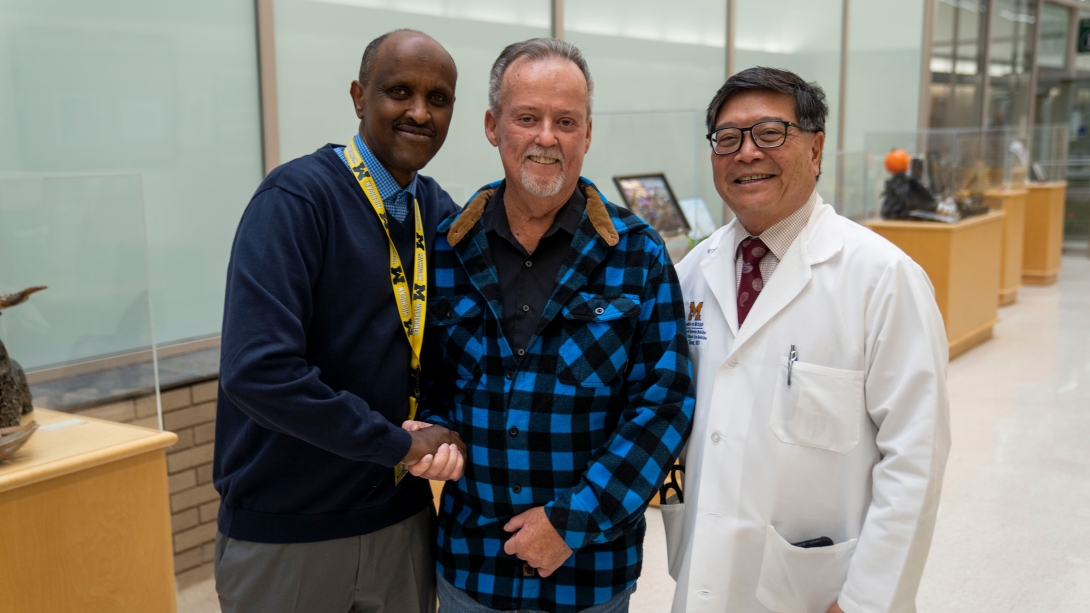
“I remember feeling like I was the most important patient in the facility,” he said. “I know that wasn't reality, but everyone made me feel that way.”
“And the twins, Courtney and Rachel!” he said, referring to Courtney Clark, N.P., and Rachel Scheich, R.N., ACNP-BC, who were both nurses in the ICU at that time and are now both nurse practitioners, Clark in the Cardiovascular Center ICU and Scheich in the Department of Vascular Surgery.
“In my sedated state, I really didn’t know which one was caring for me but they were both incredible,” he said.
Kosteniuk recalls that when he was being moved out of the intensive care unit, the staff stopped by his room to wish him well.
“One of the twins came in to say goodbye and I told her I'd come back for a visit when able. She told me a lot of people say that but they don't ever see them again,” he said.
“I remembered that and have made it a point to drop in each year near my transplant anniversary to say thanks for all they did.”
Fast forward to 2024
Sixteen years post-transplant, or “almost 17” as he likes to say, Kosteniuk is in good health and remains active, playing golf, growing hot peppers, watching Detroit and U-M sports teams, and spending time with his now grown children, Joe and Brittany, and son-in-law Nick.
“A Sunday round of golf and lunch with the kids is a perfect day,” he said.
In his retirement, he is even learning to cook and make homemade wine.
And he enjoys being entertained by long-time companion Cobalt, a nine-year-old golden mix who chases squirrels and sleeps in the sun while Kosteniuk works in his garden.
New lungs, new family and a life well-lived
Sixteen years ago, Kosteniuk could not have imagined where he would be today, or that in receiving two new lungs he would also receive a new family.
He returns to Michigan Medicine for regular medical visits in the Taubman Center Transplant Clinic with Chan and Mohamed Wehelie, R.N., post lung transplant coordinator, who’s been caring for Kosteniuk since 2014.
“Dr. Pickens, Dr. Chan and Mohamed have been the leaders in my care,” said Kosteniuk. “If not for people like these, I would not be here.”
Each year, on his transplant anniversary, Kosteniuk sends an email of gratitude to Pickens.
And at least once each year, he wanders up to the cardiovascular center's ICU to look for the twins.
“It's always wonderful to see patients come back and show us they are living a full life outside of the hospital,” said Clark. “When they ask for us specifically, it feels rewarding, as if we have made a difference in their lives.”
Clark said during his visit last year, Kosteniuk shared pictures from the day he walked his daughter down the aisle at her wedding.
“What a gift!” she said.
Sheich says when patients spend long weeks in the ICU, it's hard not to get close and feel like family.
“When they come back to visit, it is the best part of our jobs,” she said.
“We see them dressed in their clothes and healthy, and that makes it all worth it.”
It seems fitting that Kosteniuk’s most recent visit to the transplant clinic and to see the twins took place in October, which is Healthy Lung Month.
“Mr. Kosteniuk has continuous energy and positivity,” said Chan, who values the professional relationship he and Kosteniuk share and has appreciated hearing about his kids over the many years of his lung transplant success.
“He enjoys meeting people, telling stories and living life,” said Chan.
Sign up for Health Lab newsletters today. Get medical tips from top experts and learn about new scientific discoveries every week.
Sign up for the Health Lab Podcast. Add us wherever you listen to your favorite shows.

Explore a variety of health care news & stories by visiting the Health Lab home page for more articles.

Department of Communication at Michigan Medicine

Clinical Professor
Want top health & research news weekly? Sign up for Health Lab’s newsletters today!

